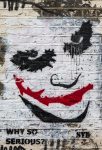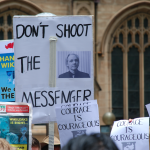Copycat Crimes

The “copycat effect” refers to crimes which are inspired by media coverage of a previous crimes – or movies and TV shows which document fictional offences.
Over the years, there have been a number of high-profile “copycat crimes” both in Australia and around the world. In recent times, psychologists have struggled to understand what drives people to commit these horrific attacks, in a bid to prevent them from occurring in the future.
Famous Copycat Crimes
Perhaps the most famous copycat crime is the tragic ‘Batman cinema shootings’ which occurred in 2012 in Aurora, Colorado.
Killer James Eagan Holmes was found guilty of unleashing a string of bullets during a midnight screening of The Dark Knight Rises, killing 12 people and injuring dozens more. Moments before the attack, he had shouted ‘I am the Joker!’ – a reference to the film’s antagonist of the same name.
Other popular films have also inspired copycat crimes: the 1999 film Fight Club is believed to have inspired a bombing which took place in New York City in 2009. 17-year-old Kyle Shaw was found to be the mastermind behind the attacks, with police believing he was attempting to launch ‘his own Project Mayhem’ against corporate America, in homage to the final scenes of the film. Those close to Shaw said he had an ‘affinity’ with the movie – he even tried to convince his high school English teacher to allow him to study it.
Even the hit TV series Breaking Bad has been linked with copycat crimes. In the show, high school chemistry teacher Walter White rises through the ranks of the drug trade by selling his signature blue methamphetamine – a hallmark which has reportedly been copied by dozens of drug dealers, many of whom are teachers!
In other cases, crimes have been inspired by past real-life offences: Notorious killer Ivan Milat was convicted of killing seven backpackers in Belanglo State Forest in the early 1990’s – years later, in 2010, Milat’s great-nephew Matthew Milat was convicted of murdering 17-year-old David Auchterlonie in the same location.
Copycat criminals have also been blamed for the rise in mass shootings in the United States, as well as the increase in murder suicides. Some experts believe that the publicity generated by these incidents inspires others, who seek fame and attention.
What Makes a Copycat?
The psychology behind copycat crimes is complex. In a recent article published in Psychology Today, academic Dr Nigel Barber says, ‘To some extent, the phenomena appear to lie outside rational analysis and more in the realm of psychological disorders.’ Despite that, Dr Barber’s paper offers some insight into how and why people bring themselves to commit these heinous crimes.
He found that copycat criminals adopt the persona of the person they are imitating to make it easier to carry out the act. This is known as ‘depersonalisation,’ allowing them to avoid the ‘natural human inhibition against killing.’
In other cases, copycats act out of desperation for attention or notoriety. Loren Coleman, an author who studies mass shootings and murder suicides and who has published a book on copycat crimes called The Copycat Effect, believes the people behind these events crave the fame afforded to the ‘original’ criminal.
How Can We Stop It?
So how can we stop copycat crimes from occurring?
Well, if theories that copycat criminals crave fame and attention are the be believed, the answer is simple: stop giving media attention to these crimes.
There is evidence to support this view: as discussed in one of our previous blogs, a study conducted by researchers at Arizona State University revealed that 20-30% of mass shootings were inspired by past events that were heavily publicised in the media.
One of the lead researchers behind the project noted that the media is a ‘vector that reaches people who are vulnerable.’
In response to these findings – and in the hopes of preventing further copycat attacks, those affected by these crimes launched the ‘No Notoriety’ campaign to place limits on media coverage of mass shootings – including a ban on publishing the killer’s name, photos and other information.






